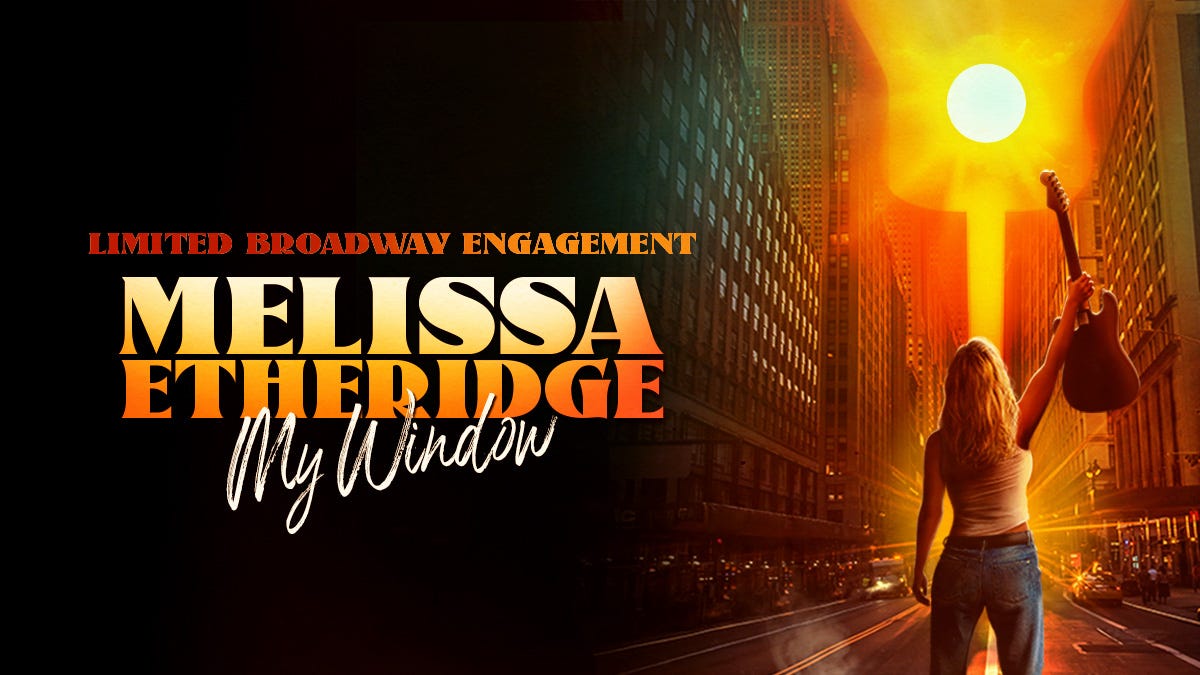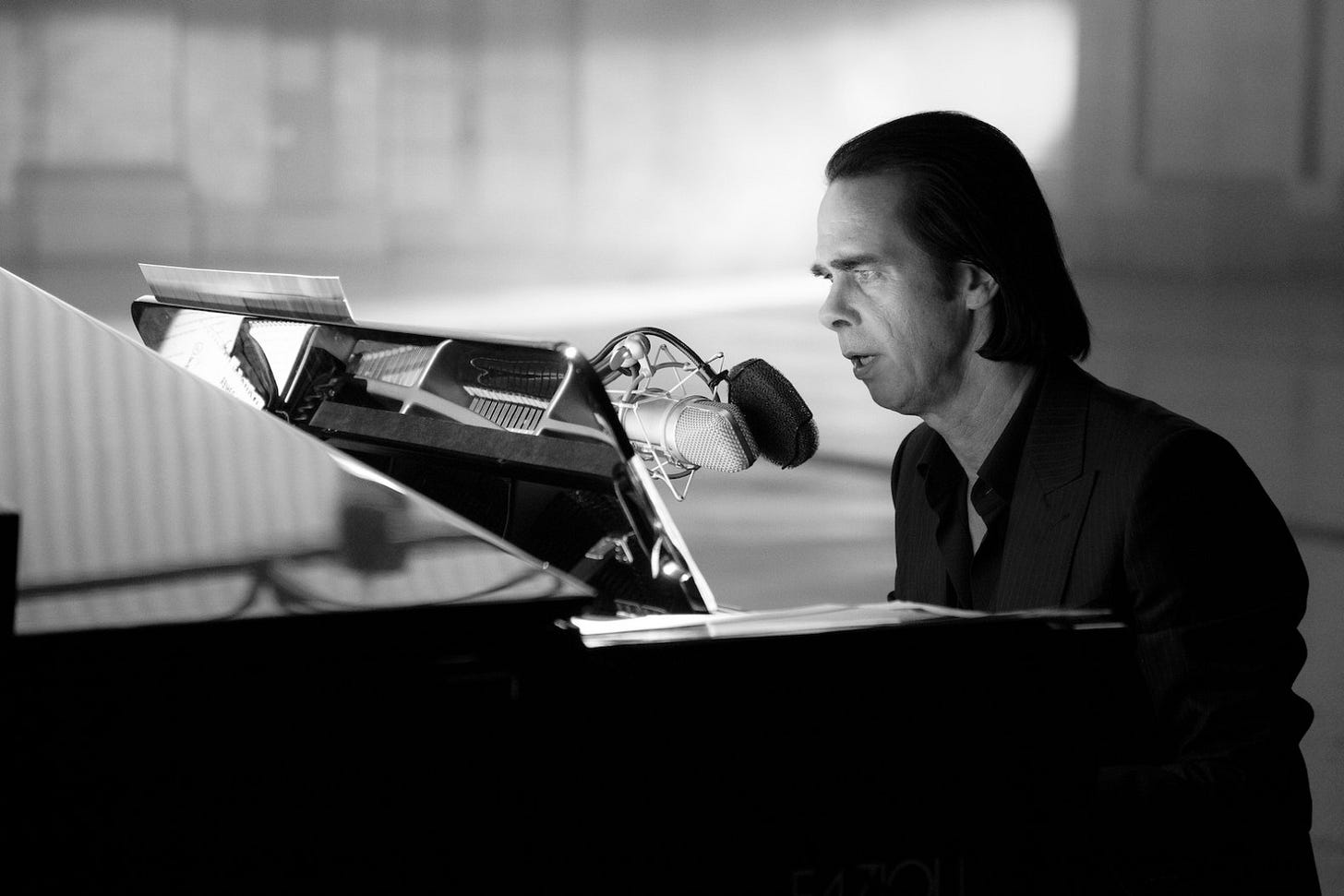A few weekends ago I saw two concerts in NYC from musicians who have both lost a child. This was not intentional, just a quick getaway for a wedding anniversary. I think grief is everywhere and if you are attuned to it, you will see it too. It can be a subtle theme, so if you are not looking for it, it can be easily dismissed or ignored.
What was unique about these two artists, is how upfront they were about the theme of grief. They were inviting the audience to confront the reality of suffering. What do you do when you can’t deny grief being presented to you? How do you react? (You probably lean into it if you signed up for this newsletter!)
Melissa Etheridge in her Broadway musical “My Window” accounts her life and rise to stardom. Her anecdotes are funny and self-revealing, as she shares the meaning behind much of her songwriting.
The starkest moment in the play is when she shares about the sudden death of her son during Covid. The music stops abruptly mid-song, jarring everyone. The theater plunges into darkness as the lights cut out. The audience is silent as she names the visceral ripping in the void between her life before and her life afterwards.
Of course, as a chaplain, I wanted to sit in that moment for much longer. The silent darkness is where I sit with others daily. It feels sacred. So much is contained in those moments. Truly, we cannot catapult to healing without spending sufficient time in that darkened theater of despair.
But as this was Broadway, the lights and music returned to end the show on a positive note. Etheridge began talking and singing about her healing and the foundation she created in her son’s memory.
It is true that existential meaning making can come for many after significant loss and a changed meaning perspective, but those shifts can feel glacially slow as we live them. While I am glad the play included a nod to the intensity of her grief, it is not always that easy to summarize, nor is it a linear path to acceptance. And certainly harder to describe while singing, playing a guitar and entertaining a room full of women who were just hoping for a sing-along.
One of the first things I teach new chaplain students is that much of what they may have learned about grief is wrong. Psychiatrist and author Elisabeth Kübler-Ross has become a household name for writing grief. Her stage theory (Denial, Anger, Depression, Bargaining and Acceptance), is well known, but has largely been taken out of context as a way to progress through grief and “move on.” But grief is not like this. There are no sequential steps and no finish line. The steps listed above might be touched on, maybe all at the same time. This is usually when I draw a jumbled mess of lines on the whiteboard. That’s what grief looks like, not neat, orderly, progressive steps.

There is no moving on, there is only moving with or moving through grief. It is a myth that anyone “gets over it.” While Kübler-Ross’ framework opened up the conversation around grief - which is absolutely a benefit - even she had grown frustrated with the ways in which her theories have been deployed, at one point writing:
“The stages have evolved since their introduction and they have been very misunderstood over the past three decades. They were never meant to help tuck messy emotions into neat packages. They are responses to loss that many people have, but there is not a typical response to loss, as there is no typical loss. Our grief is as individual as our lives.”
The next night, we went to see Nick Cave perform. It was a very different concert than his last tour, Carnage – much more about rage, with a full gospel choir! This show was stripped down, just himself and Radiohead’s bassist, Colin Greenwood on stage - only the music, no theatrics.
I just finished listening to the audio version of his book, Faith Hope & Carnage,which I would commend to anyone who is not afraid of sitting in that darkened theater of pain. Taking place during the early days of the pandemic and a year after Cave’s son had died, the book is conversations between Cave and reporter Seán O'Hagan about his grieving journey (tragically, another son of his died after the book went to print).
I read lots of books on grief but this was one of the most poetic, raw and profound ones I have come across. Cave speaks about the catharsis he found in music. Some of the songs that he wrote in a trance-like state of intense mourning are hauntingly beautiful. His album with the Bad Seeds, Ghosteen is worth listening to in its entirety with a box of tissues nearby.
Cave does not gloss over his pain in exchange for simplicity. In addition to sharing about his own anguish and moving with grief to find snippets of joy again, Cave has become a spokesperson for suffering. He started the Red Hand Files, a newsletter offering heartfelt answers to questions listeners pose to him. He talks about this work as salvific. A review in The Christian Century dubbed him a “A Misisonary of Grief.”
There is a great quote, which I’ve never been able to find attributed anywhere (if you can find it, let me know, as I cannot recall when/where I heard it). “The song of the soul that cries can only be heard by one’s soul who has already cried.” I tell my chaplaincy students, this is the crux of why we explore their own pain, so they can more fully sit with others in their pain. Cave has explored his own pain and is now able to sit with others in theirs.
In both instances, not only did these two singers find their music changed by loss, but also found a new purpose afterwards to create in different ways. This is what grief does - it changes us irrevocably and influences all aspects of our lives.
Kübler-Ross writes, “The reality is that you will grieve forever. You will not ‘get over’ the loss of a loved one; you will learn to live with it. You will heal and you will rebuild yourself around the loss you have suffered. You will be whole again but you will never be the same. Nor should you be the same, nor would you want to.”
How has grief changed you?
How have you rebuilt yourself?
How do you metabolize and process grief?
Cave and Etheridge were able to do so musically, which might be an option for you too.
Anyone who knows me, knows that I am not the least bit musical. Singing, playing guitar or piano is not going to be a cathartic spiritual practice for me. But it might be for you. Any artistic expression can help us process our own grief or any accompanying emotion. When I worked in a hospital with a music therapy program, I would occasionally work in tandem with the musical therapists. It was such a revelation how healing music can be for the patients in such a sterile, clinical environment.
Even if you are not the one making the music, the very act of listening to music can transport us somewhere sacred. It can elevate us out of the hospital room or our daily lives.
What does your soul long to listen to?
What music do you turn to when you’re in a good mood and all seems right with the world?
When nothing makes sense and despair is around you, what is your soundtrack?









How very true 💜
I followed Victoria to this post of yours. As part of a support group for military survivors, I realized that the requirement for a peer mentor to be at least a year out in their grief journey was so important. I felt so drawn to assisting others, yet being a year and a half out I knew instinctively I was not in the correct space yet to do so. You so clearly stated my problem “I tell my chaplaincy students, this is the crux of why we explore their own pain, so they can more fully sit with others in their pain. Cave has explored his own pain and is now able to sit with others in theirs.”
I can’t wait to read more from you. As always, I regret anyone has to walk along this pathway and am learning as I do.